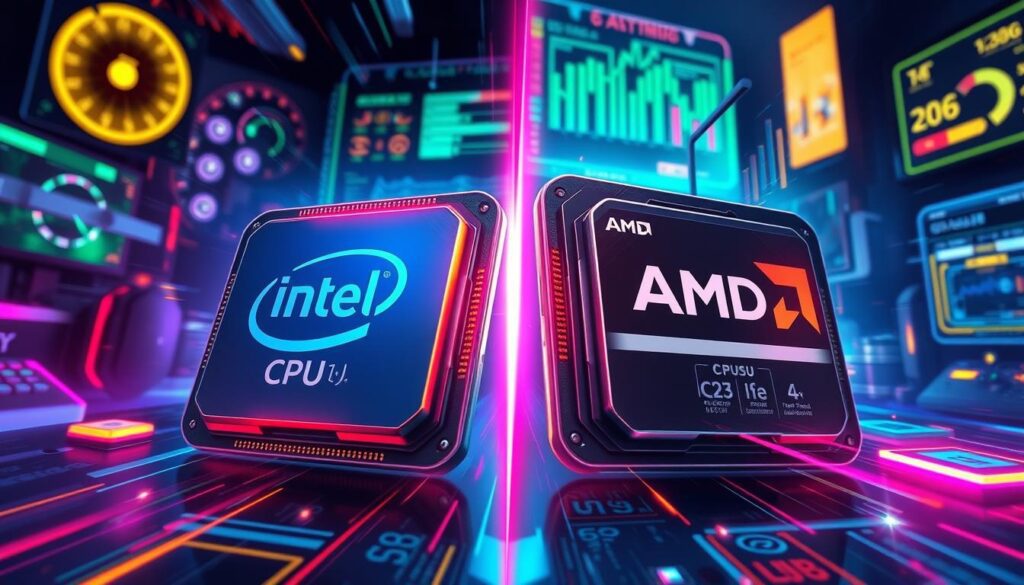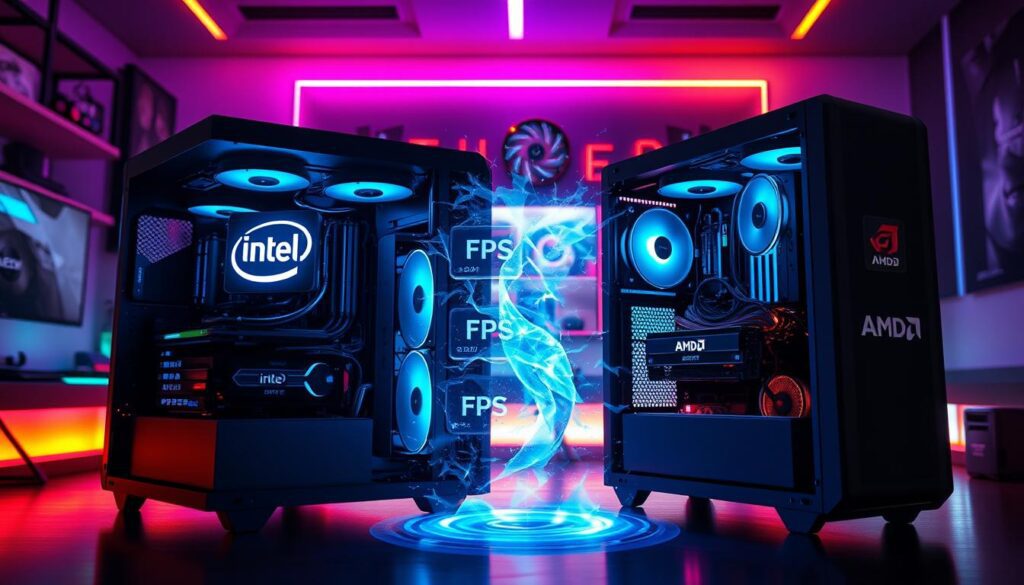Intel vs AMD for Gaming. The world of gaming processors is a battleground. AMD and Intel are always vying for dominance. Gamers must make a crucial choice that could significantly affect how they play the game.
Intel is renowned for its outstanding performance on a single core. This gives a lot of game titles a big boost. AMD, however, provides remarkable multi-core capabilities at relatively affordable prices. This makes it a desirable choice for gamers on a tight budget looking for strong performance.
Brand loyalty is no longer a factor in CPU selection. It’s about knowing what your gaming setup requires. The correct processor may bring out the best performance out of your system, regardless of how much of a gamer you are. It has the potential to greatly improve your game experience.
Important Lessons
- Intel and AMD offer unique advantages for gaming processors
- Single-core performance varies between manufacturers
- Multi-core capabilities impact overall gaming performance
- Price-to-performance ratio is key in processor selection
- Individual gaming needs should drive processor choice
The Evolution of Gaming Processors
The world of cpu architecture has seen big changes thanks to Intel and AMD’s rivalry. This competition has led to better gaming computing power. It has pushed the limits of what’s possible in performance and efficiency.
Personal computing has changed a lot over the years. Intel and AMD have been competing, each trying to make better cpu architecture designs.
The Historical CPU Battle
The fight between Intel and AMD started in the late 1960s. Both companies wanted to change computing forever. Their rivalry has had many important moments:
- 1969: AMD becomes an authorized second-source manufacturer for Intel’s designs
- 1982: AMD releases its first independent x86 processor
- 2003: AMD introduces 64-bit computing to mainstream markets
Key Technological Milestones
There have been key moments in the Intel vs AMD competition:
| Year | Intel Milestone | AMD Milestone |
|---|---|---|
| 2004 | Pentium 4 with Hyperthreading | 64-bit Opteron processors |
| 2011 | Sandy Bridge architecture | Bulldozer microarchitecture |
| 2017 | 8th Gen Core processors | Ryzen series launch |
Market Share Dynamics
The cpu architecture market has always been changing. AMD’s Ryzen series challenged Intel’s top spot by making high-performance processors more affordable.
“Innovation is the key to survival in the processor market” – Industry Expert
The battle between Intel and AMD keeps getting better for gamers. It drives innovation and makes gaming more powerful.
Intel Vs AMD For Gaming: Performance Metrics That Matter

Choosing the right processor for gaming is key. It’s not just about numbers. It’s about how well processors make games run smoothly and fast.
When picking between Intel and AMD, gamers should look at a few important things:
- Clock Speed: This is in GHz and shows how fast a processor works.
- Core Count: This is how many units handle tasks at the same time.
- Cache Size: This is temporary memory that makes data access faster.
“Not all gigahertz are created equal” – CPU Performance Expert
Gaming framerates depend on how well a processor handles complex tasks. Modern games need processors that can quickly do graphics, physics, and AI tasks without slowing down the system.
| Performance Metric | Intel Impact | AMD Impact |
|---|---|---|
| Single-Core Performance | Historically Strong | Improved Significantly |
| Multi-Core Performance | Competitive | Strong |
| Gaming Framerates | Consistently High | Increasingly Competitive |
Knowing these metrics helps gamers choose the best CPU for their gaming needs and budget.
Price-to-Performance Ratio Analysis
Intel vs AMD for Gaming. Choosing the right processor for gaming pc builds is key. Gamers look for value without spending too much. The price-to-performance ratio helps create gaming rigs that offer great gaming experiences.

When looking at processor options, gamers should focus on three main budget categories:
Budget Gaming Solutions
Strong gaming setups are accessible for individuals on a limited budget. Strong yet logically priced processors are the Intel Core i3 and AMD Ryzen 3. Important things to think about are:
- Minimum $100-$150 price range
- Suitable for entry-level gaming pc builds
- Good for esports and less demanding games
Mid-Range Options
The cost and performance of mid-range processors are excellently balanced. The best options in this category are AMD Ryzen 5 and Intel Core i5. They provide strong gaming experiences.
- Range of prices: $200-$300
- Strong multi-core performance
- Ideal for modern AAA game titles
High-End Gaming Processors
High-end CPUs are the greatest option for people who demand the best. The top processors in this category are AMD Ryzen 7/9 and Intel Core i7/i9.
- Range of prices: $350-$700
- Exceptional multi-threading capabilities
- Future-proof gaming rigs
Architecture Comparison and Gaming Capabilities
The fight between Intel and AMD processors is more than just speed. Modern gaming needs special designs that affect how well a system works. This includes how it handles games and graphics.
CPU design is key for gaming. Different designs change how well a system handles games. Let’s look at the main differences:
- Core Count and Thread Distribution
- Instructions Per Clock (IPC) Performance
- Cache Memory Architecture
- Transistor Density
Modern processors use special designs to improve gaming. Intel’s architecture usually focuses on single-core performance. AMD processors do better with many threads at once.
“Architecture determines the real-world gaming experience, not just raw numbers” – Gaming Performance Experts
Understanding how processors and graphics cards work together is important. Gamers need to see how CPU design can limit performance in games.
| Architectural Feature | Intel Performance | AMD Performance |
|---|---|---|
| Single-Core Speed | Excellent | Good |
| Multi-Core Performance | Good | Excellent |
| Graphics Card Compatibility | Strong | Very Strong |
Knowing these design details helps gamers choose the right processor. It also helps them understand graphics card benchmarks.
Power Efficiency and Thermal Performance
When we compare Intel and AMD processors, power efficiency and heat management are key. Modern processors need to balance power with smart energy use and cooling.
Power Consumption Under Load
Intel and AMD processors show big differences in power use during gaming. Gaming pushes processors hard, making efficient power use very important.
- Intel processors have better power control
- AMD processors offer good performance and energy savings
- New designs aim to use less power for each task
Cooling Requirements
Good cooling is key for a processor’s long-term performance. Both Intel and AMD have made cool solutions to handle heat.
| Processor Brand | Average Thermal Design Power (TDP) | Recommended Cooling Solution |
|---|---|---|
| Intel Core i7/i9 | 65-125 Watts | Advanced Air or Liquid Cooling |
| AMD Ryzen 7/9 | 65-105 Watts | High-Performance Air Cooling |
Temperature Management
Advanced cooling systems prevent processors from overheating. Intelligent temperature control keeps performance steady and safe during long gaming.
“Efficient thermal management is the unsung hero of processor performance” – Gaming Tech Experts
Choosing between Intel and AMD means looking at power use, cooling, and temperature control. This helps get the best gaming experience.
Final Thoughts
Intel vs AMD for Gaming. The fight between Intel and AMD in gaming CPUs keeps getting better. Gamers now have many choices, thanks to both companies. They provide excellent processors for every need and budget.
Making the decision between AMD and Intel based on your gaming requirements. Your selection should be in line with your preferred gaming style, budget, and what you expect from performance. The decision is now more difficult because both brands excel in distinct fields.
For those watching their budget, both Intel and AMD have great options. Processors that provide the best gaming experiences are available to high-end gamers. Selecting a CPU that suits your system configuration, resolution, and gaming style is crucial.
There are several excellent options for gamers on the current CPU market. With AMD and Intel, you can have the finest performance, pricing, or power economy. Choose the CPU that best suits your game needs by researching standards and completing your study.
FAQ
What are the salient distinctions between Are AMD and Intel processors suitable for gaming?
Intel processors usually have greater single-core performance. AMD CPUs, however, are less more cores and thus more costly. With the Ryzen series from AMD, they are now great for gaming and streaming since the performance difference has decreased.
Which processor is superior for low-cost game builds?
AMD is often a better choice for low-cost gaming. Their Ryzen line, which consists of the R5 and R7, offers superior performance at a lower price. This makes AMD a top pick for those watching their budget.
Do gaming framerates differ significantly between Intel and AMD?
The difference in framerates is small in today’s processors. Intel might have a slight edge in some games, but AMD’s recent processors are very close. Most gamers won’t see a big difference in real games.
How important is CPU choice for overall gaming performance?
Your CPU is very important but works with other parts like the graphics card. A good CPU helps your graphics card perform well. With the appropriate parts, both AMD and Intel can improve the way you play games.
Things I should consider while making a choice between AMD and Intel for gaming?
Consider your spending limit, your intended purpose, and whether you plan to update in the future. Examine the standards for your preferred games and compare prices. AMD and Intel both offer outstanding options for a variety of budgets and prerequisites.
Which CPUs are AMD or Intel is superior for gaming and streaming?
AMD CPUs, such as the Ryzen series, are better at Several tasks at once. They have more cores and threads. But, recent processors from Intel have also gotten better, so both can stream well depending on the model.
What is efficiency of power and comparison of heat between AMD and Intel?
AMD CPUs are typically more cooler and more power-efficient. They use less power than Intel models. But, Intel has also improved, making the gap smaller in power and heat.
Is it easy to switch between the AMD and Intel platforms for my CPU?
Most likely, you will want a new motherboard if you choose to alternate between AMD and Intel. The replacement of your CPU and RAM is also necessary. When choosing your system, take compatibility and possibilities for improvement into consideration.






